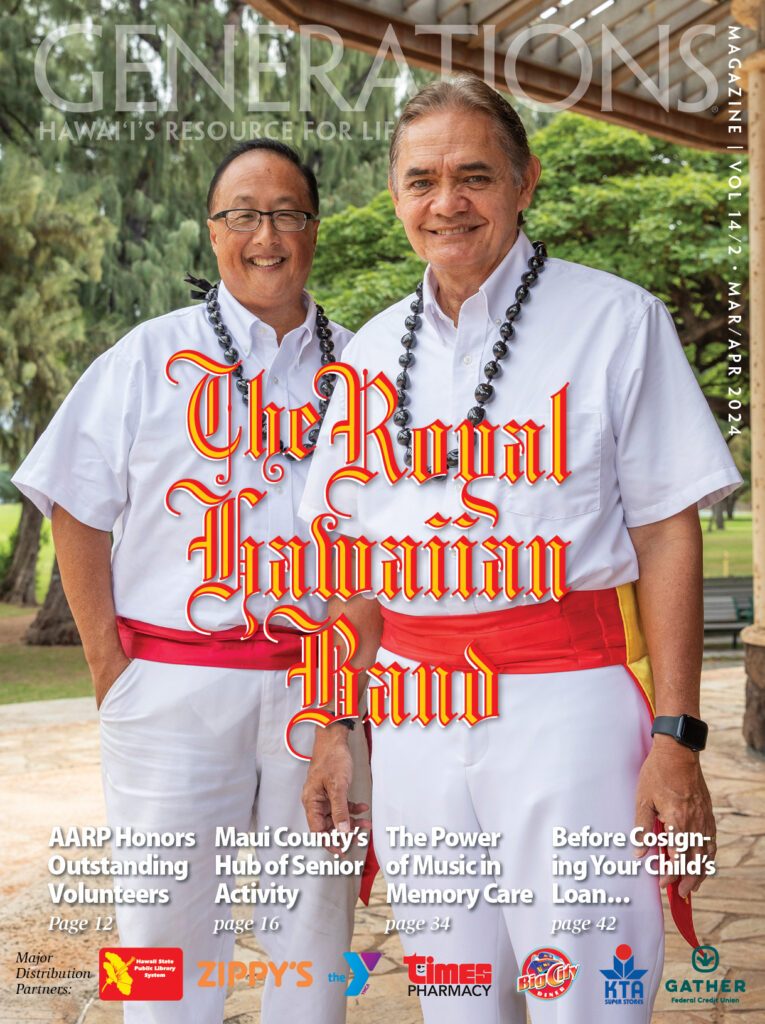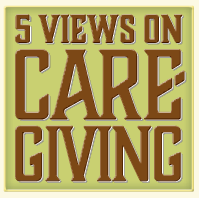 Aging with dignity is a major public health issue for the state of Hawai‘i. People of all ages work with and advocate for the elderly by providing educational resources for families and brainstorming private and public health solutions for the growing needs of kūpuna. All generations offer experience and expertise.
Aging with dignity is a major public health issue for the state of Hawai‘i. People of all ages work with and advocate for the elderly by providing educational resources for families and brainstorming private and public health solutions for the growing needs of kūpuna. All generations offer experience and expertise.
By 2029, over 70 million baby boomers in the United States will be over 65. The fastest-growing demographic is seniors over 85, numbering over 40,000 in Hawai‘i.
The blessing of longevity has two downsides: Declining health and mobility, and eventual dependence on caregivers.
Greatest Generation members, born before the great crash of 1929, lived through the Great Depression and World War II and are now in their late 80s to mid-90s. They had to be frugal, and they treasured work. They fought and volunteered for freedom, cared for elders with respect, attended school, learned a trade and respected authority. They also saw the arrival of Model T autos, jazz and aircraft.
Members of the Silent Generation were born between 1925 and 1945. Some fought in WWII and the Korean Conflict. They adopted the traditions and work ethic of their parents and kept their feelings to themselves. They enjoyed a robust post-WWII economy and a high school education. Many attended college on the GI Bill. They watched the rise of communism and shaped 20th-century pop culture, rock ‘n’ roll, TV and mainstream media.
After WWII, over 76 million baby boomers were born between 1946 and 1964. They are the wealthiest, healthiest and best-educated generation yet. As “hippie” teens, they protested against the traditional values of their parents. Their midlife “yuppie” lifestyle was adopted globally. They became experts in their fields. Cold War nuclear “detente” and recessions led them to distrust big government. They are deep thinkers, optimistic and respond to civic calls for action.
Children of baby boomers are Generation X and millennials. Generation X, born between 1965 to 1984. learned early independence as latchkey kids of working parents. Rocked by divorce and economic downturns, Gen X-ers are pragmatic, problem-solvers who adapt well to change. Technologically adept, they learn by discussion and case study. They value experience over wealth and tend to be skeptical. Generation X is less motivated than boomers to make a difference or to leave a legacy.
Millennials, born from 1985 to 2004, outnumber boomers in the U.S. workforce. They have more college degrees than any other generation; they smoke less and tend to count on friends and public welfare in tough times. They learn by trial, error and collaboration. They carry college and lifestyle debts, frequently change jobs, save less and own fewer assets than previous generations. They marry late and anticipate six decades in the workforce.
We bring you the wisdom and advice of five notable persons who have laid the foundation for eldercare and public policy for aging issues in Hawai‘i. Collectively, their ages span almost eight decades, but each has a different perspective and approach to meeting the needs of the elderly; their approaches are related to the generation into which they were born. All are “paying it forward” so that we all may age well, with dignity.
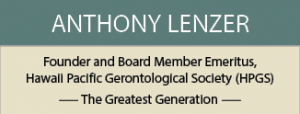 Anthony “Tony” Lenzer is a member of the Greatest Generation and a paragon of hard work. Besides HPGS, he serves on the boards of several aging advocacy groups. Tony taught gerontology (the study of old age) at The University of Michigan School of Public Health before joining the faculty at the University of Hawai‘i in 1969. He helped develop a gerontology program at the UH School of Public Health. In 1988, he served as a volunteer training coordinator for AARP Hawaii and spent several legislative sessions as aging adviser to Sen. Les Ihara Jr.
Anthony “Tony” Lenzer is a member of the Greatest Generation and a paragon of hard work. Besides HPGS, he serves on the boards of several aging advocacy groups. Tony taught gerontology (the study of old age) at The University of Michigan School of Public Health before joining the faculty at the University of Hawai‘i in 1969. He helped develop a gerontology program at the UH School of Public Health. In 1988, he served as a volunteer training coordinator for AARP Hawaii and spent several legislative sessions as aging adviser to Sen. Les Ihara Jr.
As a member of the Greatest Generation, he grew up learning how to do a lot with little and focused his energy on productive projects that would help the entire community.
“I am very proud of the work we did to expand the number of professionals focused on aging,”
Tony says. With other dedicated faculty, he created two gerontology certificate programs. Many of the 150-plus students who are certified in aging now lead nonprofits and government agencies that provide services for seniors.
Tony recently taught a five-session weekly workshop, “Aging and Dying With Dignity,” at UH’s Osher Lifelong Learning Institute, but his current focus is to increase the population of caregivers.
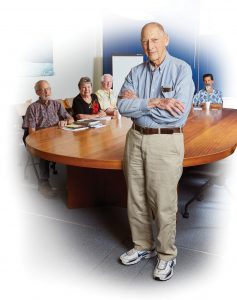 “There is a need to educate and support family caregivers within their cultural context,” Tony says. “Parallel to education is a need to develop agencies and services on all islands to deliver care in homes and facilities.” He advocates immigration policies that favor experienced caregivers from abroad and supports the initiation of caregiver training programs in colleges.
“There is a need to educate and support family caregivers within their cultural context,” Tony says. “Parallel to education is a need to develop agencies and services on all islands to deliver care in homes and facilities.” He advocates immigration policies that favor experienced caregivers from abroad and supports the initiation of caregiver training programs in colleges.
“I believe caregiving is a profession, and the state should proactively create tiered certifications to facilitate a career ladder. When caregiving blossoms as a career, it will stimulate other services —
equipment, nutrition, treatments, etc.”
He urges banks to target young wage earners for savings plans that will encourage them to build financial assets for their elder years. He also has advice for boomers:
“Many baby boomers have not accumulated or protected enough assets to pay for the rest of their retired life. They continue to work because they must. If older people are going to stay in the workforce, they need work opportunities. Other seniors who are inspired to community service will need training in skill building, leadership, consulting and advocacy.”
Tony invites his guests to pour their own coffee, joking that he is not a mover and a shaker, but “moving shakily” these days. When asked to predict the future, this member of the Greatest Generation quips, “I just want to see my 88th birthday!” If tackling difficult problems, finding solutions and cultivating a quick humor are good for the brain, Professor Lenzer will be advocating for years to come.
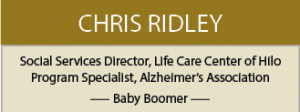 Chris Ridley is a luminary in the Alzheimer care community. Like others in her generation, she sees community needs and enlists others to join in the cause to address them. In college, she chose mental health social work as a profession and honed her skills. But in 1984, she moved to Hilo to care for her father to undergo the life-changing, on-the-job training we call caregiving.
Chris Ridley is a luminary in the Alzheimer care community. Like others in her generation, she sees community needs and enlists others to join in the cause to address them. In college, she chose mental health social work as a profession and honed her skills. But in 1984, she moved to Hilo to care for her father to undergo the life-changing, on-the-job training we call caregiving.
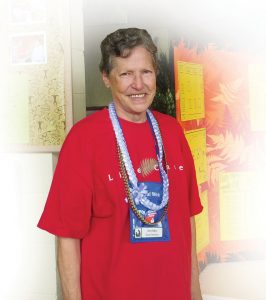 “The most critical thing I learned was to be a care partner instead of a care “giver.” My dad was not comfortable with all my care choices and displayed his frustration. I thought I knew what was best for him. When he became unable to walk, I was upset that he rejected the “Mercedes” wheelchair I selected and chose to scoot around on the floor. It was difficult, but I discovered that he slept well on
“The most critical thing I learned was to be a care partner instead of a care “giver.” My dad was not comfortable with all my care choices and displayed his frustration. I thought I knew what was best for him. When he became unable to walk, I was upset that he rejected the “Mercedes” wheelchair I selected and chose to scoot around on the floor. It was difficult, but I discovered that he slept well on
a mattress on the floor. He eagerly ate his meals from a Japanese chabudai table, and I washed the floor every day for him so his environment was clean. I learned that caregiving is not making our loved ones “normal” or “happy” but keeping them comfortable, building their self-esteem and protecting their dignity — on their selected path. This is respectful caregiving.”
Chris’ answer to needs of seniors and the elderly — especially home care for people with dementia — is community education and activation. She travels through Hawai‘i County helping families form care teams for their loved ones who want to age in their own homes.
In 1999, she founded the Early Signs Health Fair, where everyone can come for free health screening—blood pressure, sugar, kidney function, bone density, dental consults, chiropractic exams and adjustments, exercise and activity classes and presentations by physicians. Her proudest achievements are her work with Life Care, Early Signs Health Fair and increasing public awareness for Advanced Care Directives.
Chris would like to see Hawai‘i become a dementia-friendly community where we witness and honor our elders’ choices and provide help to keep them on their chosen paths.
“I was called to evaluate an elderly woman whose neighbors could not convince her to go see a doctor. The neighbors knew one another and were friends with the lady. One neighbor was taking her to the bank and grocery store. The man next door was mowing her lawn. A third was bringing in her newspaper and mail every day. The whole neighborhood was respecting her wish to stay in her home! I signed her up for services like Meals on Wheels and doctor transport. And then I offered a talk-story for all the neighbors, who had become a care team without even knowing it. I showed them which agencies can help and told them who to call in an emergency.
“This neighborhood is a blueprint for helping Hawai‘i kūpuna stay in their homes as long as possible — not taking advantage but respecting the elder’s wishes — each neighbor helping a little.”
Chris is a baby boomer who is a change agent for her community. Her legacy will be to educate Hawai‘i’s residents about home caregiving for elders with dementia and to help foster new attitudes toward elders within the community.
“My dream is that agencies and nonprofits who provide in-home caregiving services to our kūpuna will adopt a seven-day schedule to improve the consistency of care for clients who are aging in place,” she says. Consistency is a hallmark of her ability to change lives and significantly help others in need.
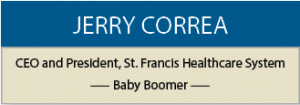 Jerry Correa is at the tail end of the baby boomer generation, planning for eventual retirement and breathing a sigh of relief that the children of boomers are striking out on their own. Around the corner looms the responsibility of caring for their elderly parents.
Jerry Correa is at the tail end of the baby boomer generation, planning for eventual retirement and breathing a sigh of relief that the children of boomers are striking out on their own. Around the corner looms the responsibility of caring for their elderly parents.
Jerry became president and chief executive officer of St. Francis Healthcare System of Hawaii in 2012. With the blessings of the Sisters of St. Francis and the St. Francis Healthcare System’s board of directors, coupled with support from his leadership team, he is moving full speed ahead to meet the needs of seniors and family caregivers.
As the first lay leader of St. Francis Healthcare System, he received valuable advice from the sisters: “Give the ku¯puna and caregivers what they tell you they need.”
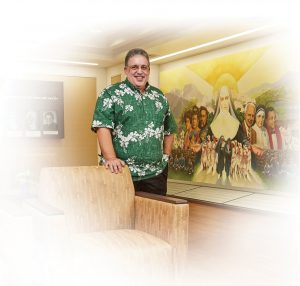 Jerry says, “We faced some hard decisions in order to reinvent ourselves. We needed a strategic plan to carry forward the values, mission and success of the sisters of St. Francis, so I studied how they organized and administered their ministries.” His information technology background compelled him to take a systemic, logical approach to the planning process.
Jerry says, “We faced some hard decisions in order to reinvent ourselves. We needed a strategic plan to carry forward the values, mission and success of the sisters of St. Francis, so I studied how they organized and administered their ministries.” His information technology background compelled him to take a systemic, logical approach to the planning process.
Giving kūpuna what they want meant replacing the traditional medical care model with a broad range of home- and community-based services for Hawai‘i’s growing population of seniors who want to stay healthy and age in place.
While St. Francis’ kūpuna services in the community continue, Jerry and his team are transforming the Lilihā campus into the St. Francis Kūpuna Village, a one-stop center for health and wellness services, adult day care, caregiver services, and assisted living and skilled-nursing facilities. “This model gives kūpuna and their families easy access to all services at one location and maintains their ties to friends, family and community,” he says.
In April 2015, the Lilihā campus welcomed the addition of a skilled-nursing facility. In 2018, active kūpuna and caregivers will be able to enjoy a full array of health and wellness services on the Lilihā campus. A team of social workers who understands cultural traditions, family dynamics and critical needs for emotional and spiritual support will coordinate all healthcare services.
While the St. Francis kūpuna Village is under development, St. Francis is giving seniors and caregivers a taste of what is to come with caregiving classes, fitness classes for seniors and other services. And, as the needs of the community change, St. Francis Healthcare System will continue to offer new services and programs.
The best is yet to come!
As the Lilihā campus and programs gradually become available, Jerry keeps kūpuna posted with inspiring weekly messages on the St. Francis website’s news page (www.stfrancishawaii.org/news).
He keeps listening to what seniors say and need.
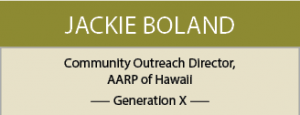 Jackie Boland, a familiar friend of kūpuna, directs AARP’s community events and educational resources for Hawaii residents over age 50. She relies on an army of volunteers, who are AARP members themselves, to help plan and implement programs that appeal to everyone across the board — from those in the workforce to frail seniors nearing end of life. “In Hawai‘i, we have a rapidly aging population that can look forward to greater longevity and health than on the mainland. Therefore, we approach our work from two directions: Helping those who are healthier to access tools and resources that can help them experience their possibilities, and helping frail ones in need of assistance and advocacy. For those in good health, my challenge is to develop ‘Fun with Purpose’ activities that engage people in stimulating activities, disrupt aging and redesign our communities. People over 50 have so much to contribute to the community and to themselves,” she says.
Jackie Boland, a familiar friend of kūpuna, directs AARP’s community events and educational resources for Hawaii residents over age 50. She relies on an army of volunteers, who are AARP members themselves, to help plan and implement programs that appeal to everyone across the board — from those in the workforce to frail seniors nearing end of life. “In Hawai‘i, we have a rapidly aging population that can look forward to greater longevity and health than on the mainland. Therefore, we approach our work from two directions: Helping those who are healthier to access tools and resources that can help them experience their possibilities, and helping frail ones in need of assistance and advocacy. For those in good health, my challenge is to develop ‘Fun with Purpose’ activities that engage people in stimulating activities, disrupt aging and redesign our communities. People over 50 have so much to contribute to the community and to themselves,” she says.
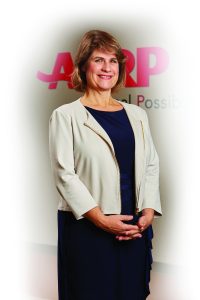 Older adults who are not in the workforce are a great resource for our community.Jackie says that society has to catch up and change the way we think about retirement. Many retirees want to contribute and maximize their skills to maintain their healthy productive years. They are a talented volunteer force for community activities because of their lifetime of experience and self-knowledge.
Older adults who are not in the workforce are a great resource for our community.Jackie says that society has to catch up and change the way we think about retirement. Many retirees want to contribute and maximize their skills to maintain their healthy productive years. They are a talented volunteer force for community activities because of their lifetime of experience and self-knowledge.
Boland points out that the elderly population (over 85) is growing fast. Nearly all of them want to age at home, and this is only possible when they receive help from family and friends. One in four of Hawai‘i’s adults is a caregiver of parents or spouses, and AARP is working hard to support them with educational resources and workshops.
“We feel passionate about helping family caregivers. Without them, our kūpuna would be reliant on government programs, and neither we as a community or they as individuals can afford that. We work hard to link caregivers to resources, teach them how to care for themselves while caring for family members and advocate for them in the Legislature.
“I have a passion for helping women because they live longer and often take on the work of caring for family, putting their own needs aside. Many women stop working or work less, with the result that they earned less and accrued less savings and Social Security. Therefore, their financial resources and benefits are lower in old age. They often outlive their family caregivers and their resources, adding to their mental and physical stress in old age. Our women’s scholarship program has helped so many up-grade their skills and get training and education otherwise not available to them.
“I want to reach everyone over 50 and let them know about the many AARP programs and educational resources here to help them live their best lives. That’s why we collaborate with many partners like Generations Magazine, to provide educational resources for seniors. If everyone can learn to make good choices to plan for their later years, then growing older can be FUN,” Jackie says.
Let’s take her advice and start by learning and planning now. We can talk with our families to make sure we have sufficient resources to live with dignity and be productive community members for life. All the answers to our questions, and needs, are there if we only reach out.
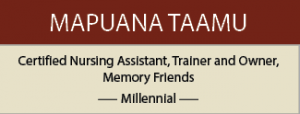 Mapuana Taamu is a busy and productive millennial. Her passion and drive are focused on helping our aging population. She balances multiple jobs: Nursing care in a facility that specializes in memory care, and home care training and services through her own company, Memory Friends, which uses Positive Approach® to Care (PAC) curriculum to teach family caregivers empathetic techniques for giving care. Taamu attends Kapi‘olani Community College (KCC), pursuing an associates of arts degree in accounting and business. She also works part-time for Generations Magazine, managing social media and writing resource articles for you.
Mapuana Taamu is a busy and productive millennial. Her passion and drive are focused on helping our aging population. She balances multiple jobs: Nursing care in a facility that specializes in memory care, and home care training and services through her own company, Memory Friends, which uses Positive Approach® to Care (PAC) curriculum to teach family caregivers empathetic techniques for giving care. Taamu attends Kapi‘olani Community College (KCC), pursuing an associates of arts degree in accounting and business. She also works part-time for Generations Magazine, managing social media and writing resource articles for you.
Her passion for healthcare and dementia care, in particular, stems from seven years as a volunteer with Hospice Hawai‘i, Project Dana, Kokua Mau and Hale Kū‘ike in Kāne‘ohe. She attends Kupuna Caucus, is an advanced care planning speaker for Kokua Mau and is an active member of the Kahalu‘u Lions Club. In a short time, she has accumulated a lot of experience in aging.
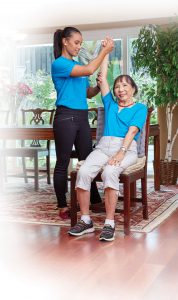 “I look like a person you would label a millennial — with tattoos, who enjoys attending meetings in skinny jeans and a white tee,” says Mapuana. She is quick to promote her accomplishments and independent, pragmatic approach to life. Like many millennials, she places a high value on experience and is comfortable collaborating with teams where she can apply her honed skills and the skills of others toward results.
“I look like a person you would label a millennial — with tattoos, who enjoys attending meetings in skinny jeans and a white tee,” says Mapuana. She is quick to promote her accomplishments and independent, pragmatic approach to life. Like many millennials, she places a high value on experience and is comfortable collaborating with teams where she can apply her honed skills and the skills of others toward results.
She counts on her “amazing EQ,” or emotional quotient when working with patients and their families. Like IQ tests, EQ tests measure your capacity for knowing and expressing your emotions and reading emotional expressions of others. “Dementia primarily affects the left half of the brain, the center of language, comprehension and vocabulary. Therefore, non-verbal behaviors say more than words. Reading facial expressions and body language becomes a necessary care skill.
“Memory Friends is my homecare service for forgetful seniors and their families. We teach Caregiver Action Network (www.caregiveraction.org) programs that train caregivers how to interpret the challenging behaviors and body language of their loved ones with dementia. We help clients adapt a routine of simple exercises that improve health, clarity and attitude,” she says.
She is majoring in caregiving through first-hand experience and minoring in business on the typical route — college.
“If only other health professionals could see past my young age and place as much value on my experience as they do on higher educational degrees, then I, and many others, could begin working on these issues and finding the answers.”
Mapuana has a message for her generation: “Everyone can make a difference. Healthcare is a great career path with many rewards. I invite other millennials to attend meetings, get involved and let your ideas be heard. Let’s collaborate and lead our generation.”
AGING IS WALKING IN A CIRCLE
We live in a world with more aging persons than previous generations. Although each generation has its own “personality” and ways of facing challenges, we walk the circle of life together — from dependent childhood and productive midlife, to retirement and dependent old age. As we try to meet the growing challenges of aging in the 21st century, all generations have much to offer. The Greatest Generation laid the foundation for all the services and public programs we now have for the elderly. Baby boomers are working to support and multiply these services for their parents and themselves.
They have accumulated wealth and assets and developed public awareness about aging. The technologically skilled, independent thinkers of Gen X and the compassionate, problem-solver millennials are applying their skills and logic to improve community support for their parents. They’re planning for their own elder years, which will be longer and more productive yet. Where are you in the circle of aging? Are you actively planning for your elder years? What can you do to make the future even better?
ARTICLE RESOURCES
AARP Hawaii
1132 Bishop St., #1920, Honolulu, 96813
808-545-6024 | https://www.aarp.org/states/hi.
AARP is a national, nonprofit group for adults over age 50. The Hawai’i chapter advocates for financial resilience, safe housing, healthy lifestyles, long-term care, livable communities and more.
Hawaii Pacific Gerontological Society
P.O. Box 3714, Honolulu, 96812
www.hpgs.org | 808-722-8487
The nonprofit HPGS strives for the well-being of seniors in the Pacific Islands. Annual events include job fairs, conferences and fundraising.
University of Hawai’i – Mānoa, Center On Aging
Gartley Hall, 2430 Campus Rd., Honolulu, 96822
808-956-5001 | www.hawaii.edu/aging/
COA is the “catalyst of academic excellence in gerontology” for aging groups in the Pacific Islands. It comprises experts in medicine, law, sociology, disability and family resources, nursing and more.
Life Care Center of Hilo
944 W. Kawailani St., Hilo, 96720
808-959-9151 | www.lifecarecenterofhilo.com
The second-largest nursing home in Hawai’i, this facility has an Alzheimer’s and dementia unit, patient rehabilitation and 24-hour nursing care.
Alzheimer’s Association
1130 N. Nimitz Hwy., Ste. A-265, Honolulu, 96817
808-591-2771 | www.alz.org/hawaii/
One of 70 branches nationwide, the AA Aloha chapter advocates for Alzheimer’s care, support and research, and hosts caregiver meetings on Hawai’i Island, Kaua‘i, O‘ahu and Maui.
St. Francis Healthcare System of Hawaii
2226 Liliha St., Honolulu, 96817
808-547-6500 | www.stfrancishawaii.org
St. Francis offers hospice, adult day care, personal care, senior education and a retirement community in Ewa. Phases 2 and 3 of Ku¯puna Village are scheduled to be completed in 2018 and 2019.
Hospice Hawai‘i
860 Iwilei Road, Honolulu, 96817
808-924-9255 | www.hospicehawaii.org
Hospice Hawai’i offers end-of-life care in the patient’s home or chosen setting. Interpreters in 15 languages are ready to help.
Project Dana
2720 Nakookoo St., Honoulu, 96826
808-945-3736 | www.projectdana.org
Project Dana is a volunteer-based program for
elderly people and their caregivers. Services include visits, home-safety evaluations, respite,
light housekeeping, home repairs and errands.
Kokua Mau
P.O. Box 62155, Honolulu, 96839
808-585-9977 | www.kokuamau.org
Kokua Mau is a professional group for hospice, advanced-care planning and palliative care. Meetings, workshops and webinars are available.
Hale Kū‘ike
95 Kawananakoa Pl. | 595-6770 (Kalihi)
45-212 Kāne‘ohe Bay Dr. | 808-235-6770 (Kāne‘ohe)
www.halekuike.com
Hale Kū‘ike, a residential-home group specialized in Alzheimer’s disease and dementia, employs staff trained in the Positive Approach to Care® model.

